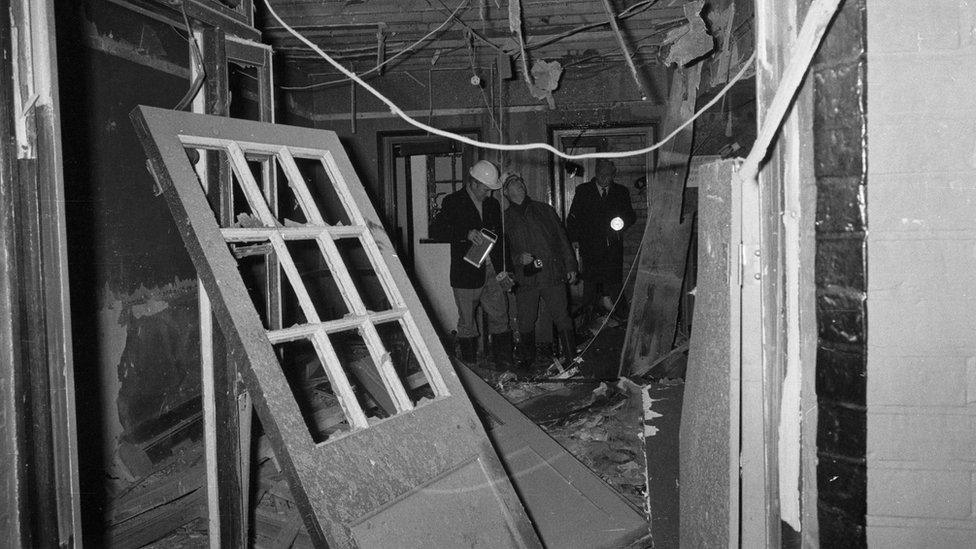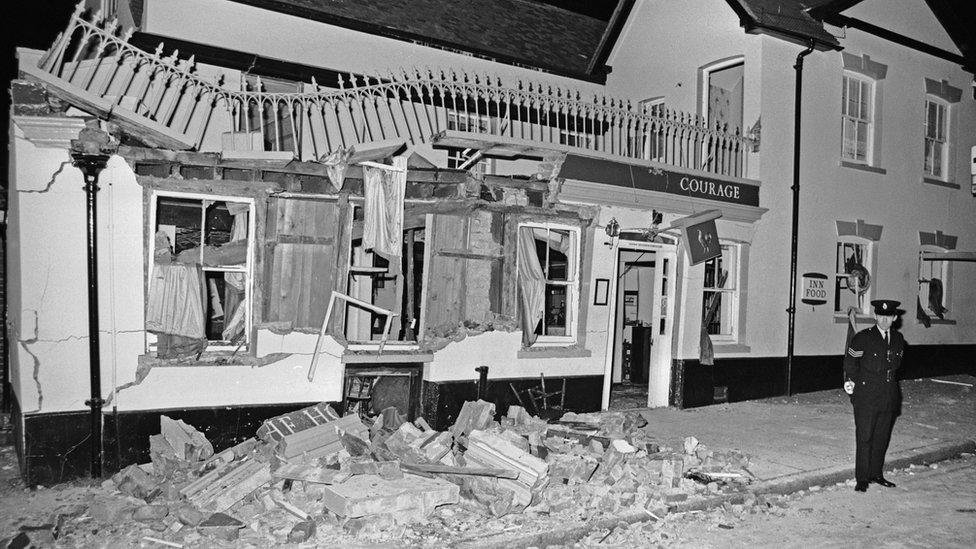Guildford IRA pub bombing inquest: Death of young was 'tragic', says coroner
- Published

The court heard there was a lull between an attack at the Tower of London and the bombings in Guildford
A coroner has spoken about the "poignant" loss of young lives in IRA attacks in Guildford 48 years ago as an inquest resumed into five deaths.
The IRA blew up two bombs in the Surrey town, targeting soldiers in 1974.
Surrey coroner Richard Travers said a "tragic" feature of the attack was the age of the victims.
Four soldiers and a civilian - aged between 17 and 21 - died when bombs detonated at two pubs on 5 October 1974. Sixty-five people were injured.
The Guildford Four and Maguire Seven were wrongly-convicted before the IRA claimed responsibility.
Pen portraits were read at the inquest for 21-year-old civilian Paul Craig and soldiers Ann Hamilton, 19, Caroline Slater, 18, William Forsyth, 18, and John Hunter, 17.
Ms Hamilton had been big sister to two-year-old Cassandra Hamilton, who wrote about how she remembered Ann telling her stories before she tucked her into bed, with the words "I love you Sugar", the inquest heard.

Caroline Slater, 18, Ann Hamilton, 19, William Forsyth, 18, John Hunter, 17, and plasterer Paul Craig, 21, died in the first explosion at the Horse and Groom
Mr Forsyth, known as Billy, had grown up in Barrhead, Renfrewshire, along with Mr Hunter.
The hearing at Woking Coroner's Court also heard that Mr Forsyth had been "over the moon" at becoming an uncle, while Mr Hunter's family wrote about how they never recovered from his death.
They said: "He was prevented from falling in love, getting married, having children and grandchildren, having a career, travelling - all the things that make for a happy and fulfilling life."
Mr Travers said: "Part of the poignant and tragic feature of this case is that those who died were so young."
Before the inquest, one of the key questions posed by Ms Hamilton's family was whether her sister's barracks could have been locked down and her sister protected from an ongoing IRA campaign.
Mr Travers heard from history expert Prof Thomas Hennessey about the IRA campaign leading up to the attacks in the Surrey garrison town.
He described how the Provisional IRA began bombing England in 1973 and how its campaign evolved over time with incidents targeting the military including an explosion at Pirbright army base and the devastating M62 coach bomb in 1974.
The court heard that between March 1973 and March 1974 there was a period of sustained terrorist activity, with 130 Provisional IRA incidents recorded in England.
Earlier in the hearing, Mr Travers said the convictions of the Guildford Four meant inquests were deemed unnecessary in the 1970s.
The inquest, which is sitting without a jury, is not looking at perpetrators, the wrongful convictions or the original police investigation.
It is looking at "preparedness for an attack of this kind", including what security alerts were in place, events in the Horse and Groom pub, the actions of those who died, and the nature of the bomb that exploded there.

Follow BBC South East on Facebook, external, on Twitter, external, and on Instagram, external. Send your story ideas to southeasttoday@bbc.co.uk.
Related topics
- Published8 February 2022

- Published14 January 2022
